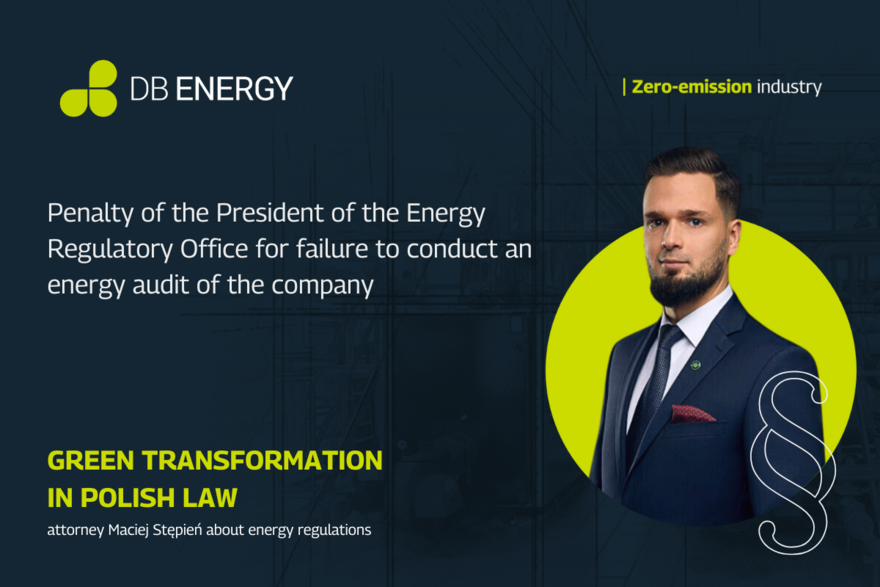Penalty of the President of the Energy Regulatory Office for failure to conduct an energy a udit of the company
In this entry from the series "Green Transformation in Polish Law," attorney Maciej Stępień discusses the topic of penalties that may be imposed on entrepreneurs by the President of the Polish Energy Regulatory Office (URE) for failing to conduct an energy audit of the company. The discussion is structured in a Q&A format, addressing key aspects of this regulatory obligation.

It is crucial for businesses to be aware that, according to current legislation, failure to conduct an energy audit for large companies can result in a penalty imposed on the entrepreneur. The penalty can be as high as 5% of the revenue generated in the previous tax year. This penalty is a form of administrative sanction for not fulfilling the statutory obligation to conduct an energy audit.
What is the obligation to conduct an energy audit of a company?
The obligation to conduct an energy audit stems from the Act of May 20, 2016, on energy efficiency, specifically Article 36. With some exceptions outlined in the Act, every large entrepreneur is required to conduct an energy audit every four years or commission it to be conducted by an independent entity with the necessary expertise and professional experience.
Is every entrepreneur obliged to conduct an energy audit?
No, the mandatory audit applies only to large entrepreneurs as defined by the Act of March 6, 2018 - Entrepreneurs' Law. Micro, small, and medium-sized enterprises are exempt from this obligation. Large enterprises are defined as companies that, on average, over the last two years:
- Employed at least 250 people, or
- Achieved an annual net turnover from the sale of goods, products, and services, along with financial operations, exceeding the PLN equivalent of EUR 50 million, and the total assets of the balance sheet at the end of one of these years exceeded the PLN equivalent of EUR 43 million.
Is conducting the audit alone enough to avoid penalties?
In addition to performing the audit, the entrepreneur is required to notify the President of the Energy Regulatory Office about the energy audit within 30 days of its completion, but no later than December 31 of the year in which the audit was required to be conducted.
It is also important to note that the entrepreneur must retain data related to the company's energy audit for five years for inspection purposes.
What determines the amount of the penalty?
The justification for imposing administrative fines and the amount are subject to the administrative discretion of the body imposing these penalties. The maximum penalty can be up to 5% of the revenue earned in the previous tax year. The law does not specify a minimum level of the penalty.
Can the decision of the President of the Energy Regulatory Office be appealed?
Yes, an appeal can be filed with the District Court in Warsaw - the court of competition and consumer protection. This must be done within 14 days from the date of delivery of the decision to penalize the entrepreneur. However, it is worth noting that before a decision is issued, the entrepreneur is typically notified about the initiation of administrative proceedings regarding the imposition of a penalty. This is the time when the company can take remedial actions, such as conducting the audit and applying for a waiver of the penalty or, if the penalty is imposed, requesting it be set at the minimum level.
Can the management board of a large enterprise be held liable for a penalty imposed by the President of the Energy Regulatory Office?
In principle, each member of the management board is liable to the company for damage caused by a culpable act or omission that is contrary to the law. Since the law mandates that energy audits be conducted every four years, members of the management board could be held liable for failing to meet this obligation.
Has the President of the Energy Regulatory Office imposed penalties in the past? In what amounts?
Revenues from financial penalties constitute state budget revenue, which has led to concerns among entrepreneurs about whether penalties as high as 5% of revenue might be used as a tool for unfavorable fiscal policies. However, according to information provided by the President of the Energy Regulatory Office to the Minister responsible for energy, URE has so far received several thousand notifications from entrepreneurs about conducted energy audits, and there is no information about penalties being imposed in this regard.
Nevertheless, the regulations allowing for the penalization of entrepreneurs are in effect and may be enforced by the President of the Energy Regulatory Office during the next audit period, likely around 2024/25.
What happens if the deadline for conducting an energy audit is missed?
If the deadline is missed, the audit should be performed or commissioned as soon as possible. The Efficiency Act allows the authority to refrain from imposing a penalty if the violation is deemed insignificant and the entrepreneur fulfills the audit obligation before the President of the Energy Regulatory Office becomes aware of the failure to meet the deadline.